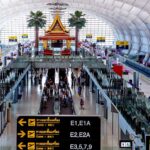Indonesia will open the island of Bali to all foreign travelers on February 4, officials said yesterday, the latest step in Southeast Asian nations’ attempts to resuscitate their economically vital tourism sectors after two years of pandemic-induced closures.
Luhut Pandjaitan, Indonesia’s coordinating minister for maritime affairs and investment, told a news conference that the quarantine time for fully vaccinated travelers would be shortened to five days, down from seven currently.
In October, Bali officially opened to visitors from a limited number of countries, including South Korea, China, Japan, the United Arab Emirates, and New Zealand, but there have since been no direct international flights to the island.
Bali welcomed just 45 foreign visitors last year after 1.05 million in 2020 and 6.2 million international visitors in 2019, the year before the pandemic hit.
One of the reasons why COVID-19 has been so devastating for Southeast Asian economies is that many of the region’s economies are unusually dependent on international tourism, which ground to a halt.
Thailand drew just short of 40 million foreign visitors in 2019, while Malaysia drew 26.1 million, Indonesia attracted 16.1 million, and the Philippines 8.3 million.
Few regions have been as heavily affected as the island of Bali, where tourism makes up an amazing 54 percent of the local economy.
Bali sealed its borders to international visitors in April 2020, the month after the World Health Organization declared COVID-19 a global pandemic, and plans for a reopening have been delayed several times due to fresh outbreaks.
The Indonesian announcement, which followed a decision to open Batam and Bintan islands near Singapore to travelers from the city-state, comes after similar moves from the governments of the Philippines and Thailand, both of which had put opening plans on hold at the end of last year as the Omicron variant of COVID-19 swept across the region.
The Philippines announced this week that it reopen its borders to tourists on February 10 after being closed for nearly two years due to COVID-19. Under the new rules, vaccinated visitors will no longer need to go through a mandatory quarantine.
Starting today, the Philippine government is also removing quarantine requirements for vaccinated Filipinos returning to the country.
Similarly, Thailand announced on January 20 that it would resume its own quarantine-free travel scheme on February 1, after a month-long suspension that was imposed after just seven weeks due to concerns about the effectiveness of vaccines against the Omicron variant.
It is tempting to conclude that the series of reopening marks the beginning of the end for Southeast Asia’s great tourism recession.
But public hesitancy and, in addition to the emergence of new variants of the coronavirus – something that it is almost a certainty given the low rates of vaccination across much of the Global South – will likely continue to haunt any business reliant on easy and inexpensive crossborder travel.




